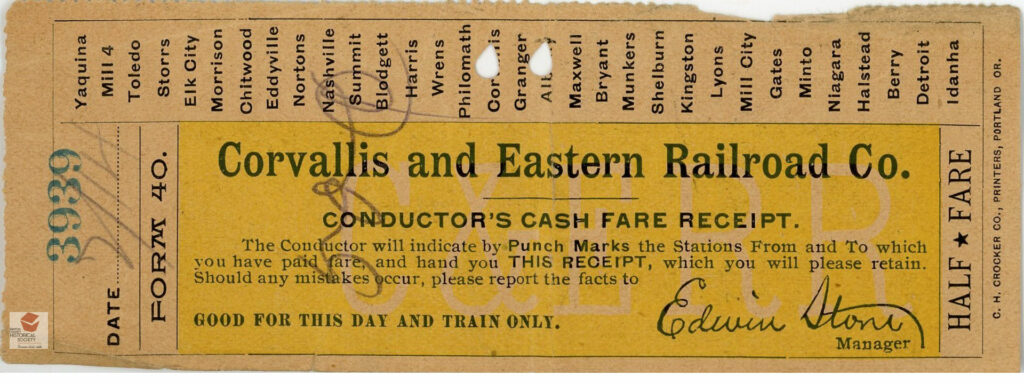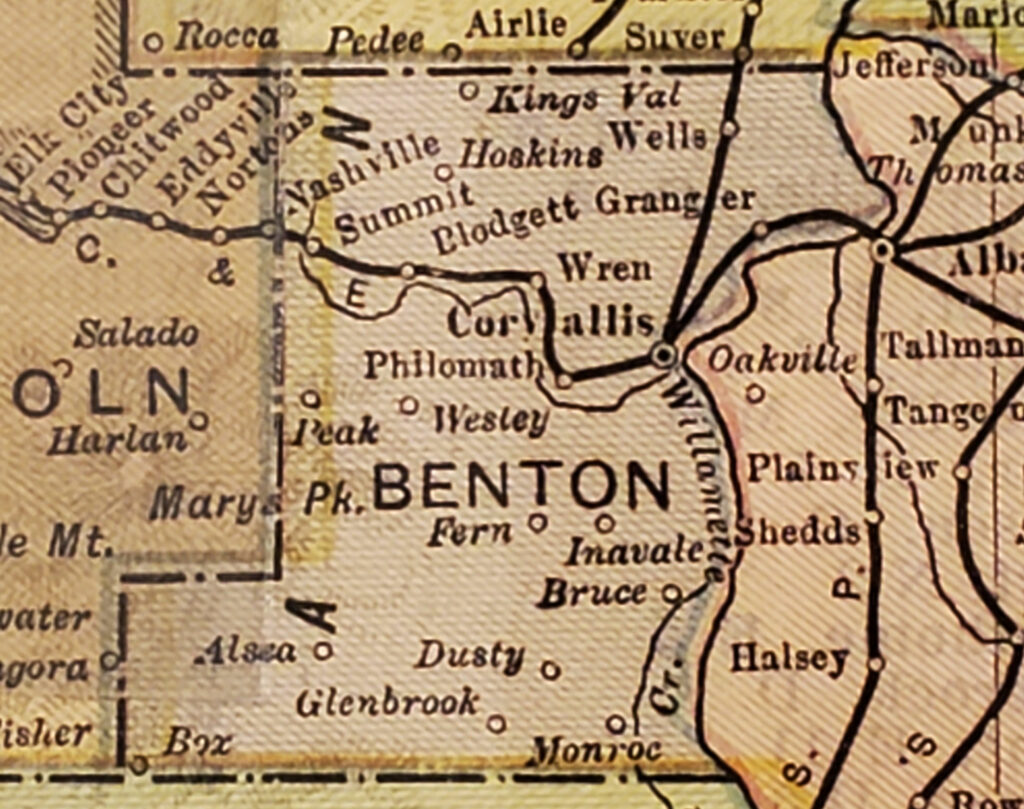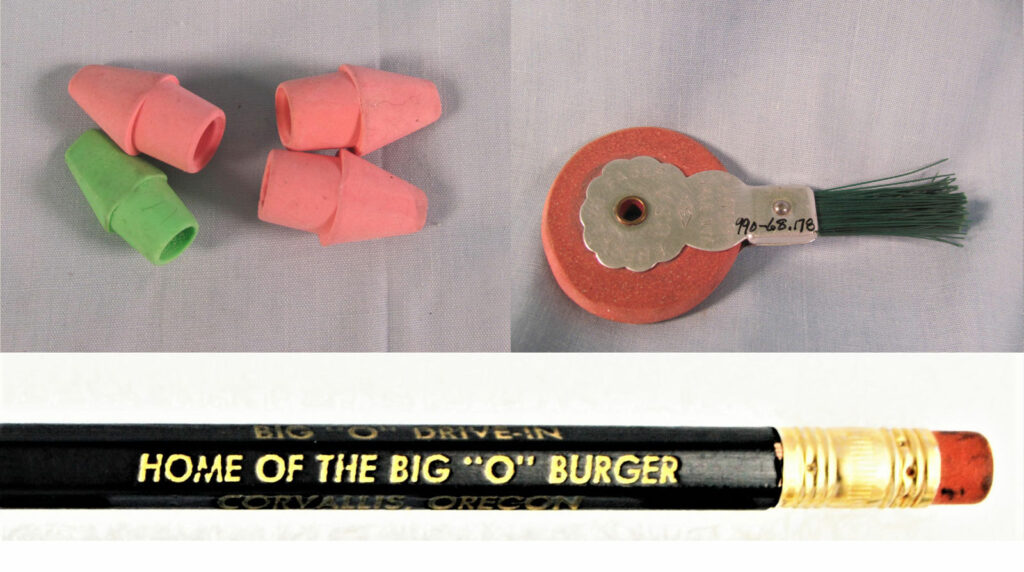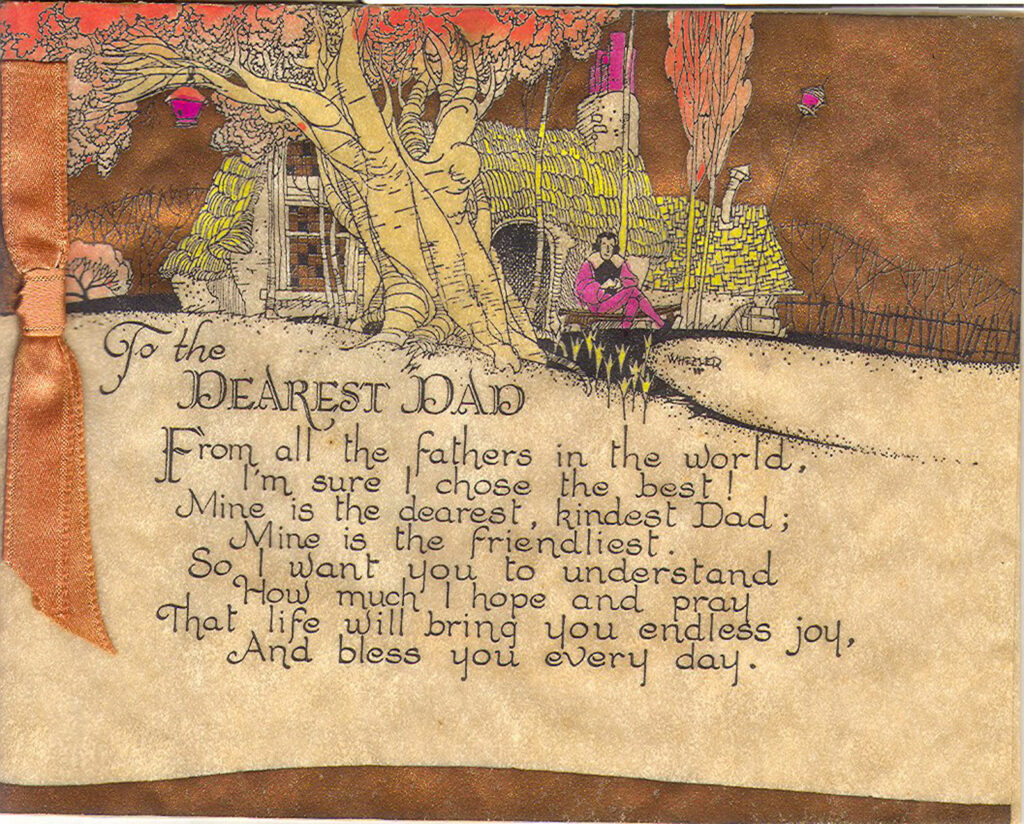One of the many documents in the Benton County Historical Society archive is a write-up of a 2001 interview with Bill Dixon. Dixon, who was born in 1927, was the son of Virgil and Martie Plunkett Dixon, the grandson of Henry Plunkett and the great grandson of Ashna and James Plunkett. Ashna was thought to be the first white child born in Kings Valley (in 1847). Dixon spent part of each summer at his grandparent’s farm and moved there in 1939 after his parents divorced. He was 12 or 13 at the time. The Henry Plunkett farm property is now Beazell Memorial Forest.
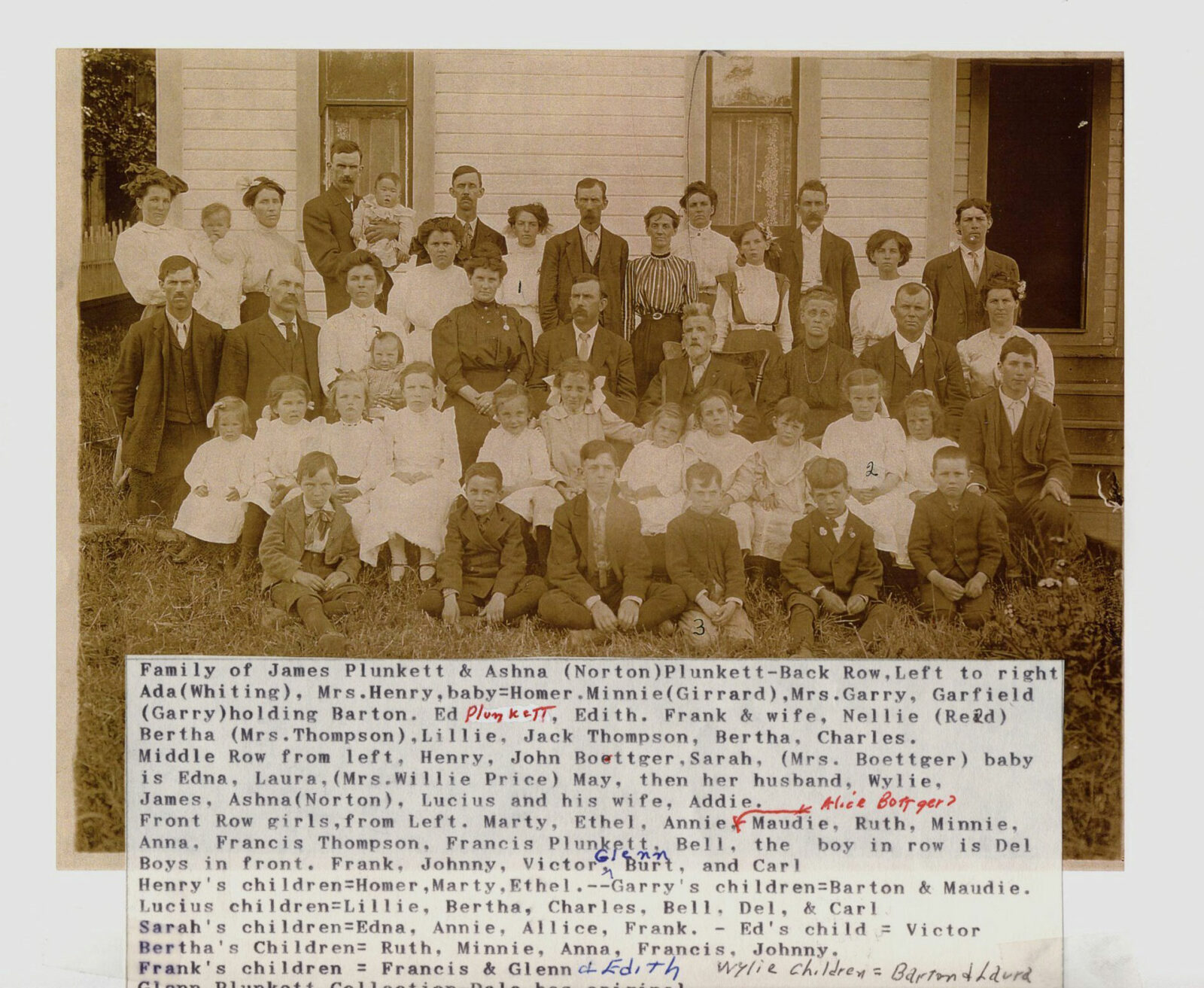
Bill Dixon’s mother, Martie, is the girl on the left of the front row of girls. His grandfather Henry is the man on the left of the middle row. Henry’s wife Ada is the second woman from the left in the back row. Great grandparents James and Ashna Plunkett are the older couple who are third and fourth from the right in the middle row.
This post features some of Bill Dixon’s recollection of his childhood on the farm. The next one will describe life on the farm in the thirties and forties.
Bill Dixon recalled his school days:
“I walked to grade school at Alexander, which is gone.”
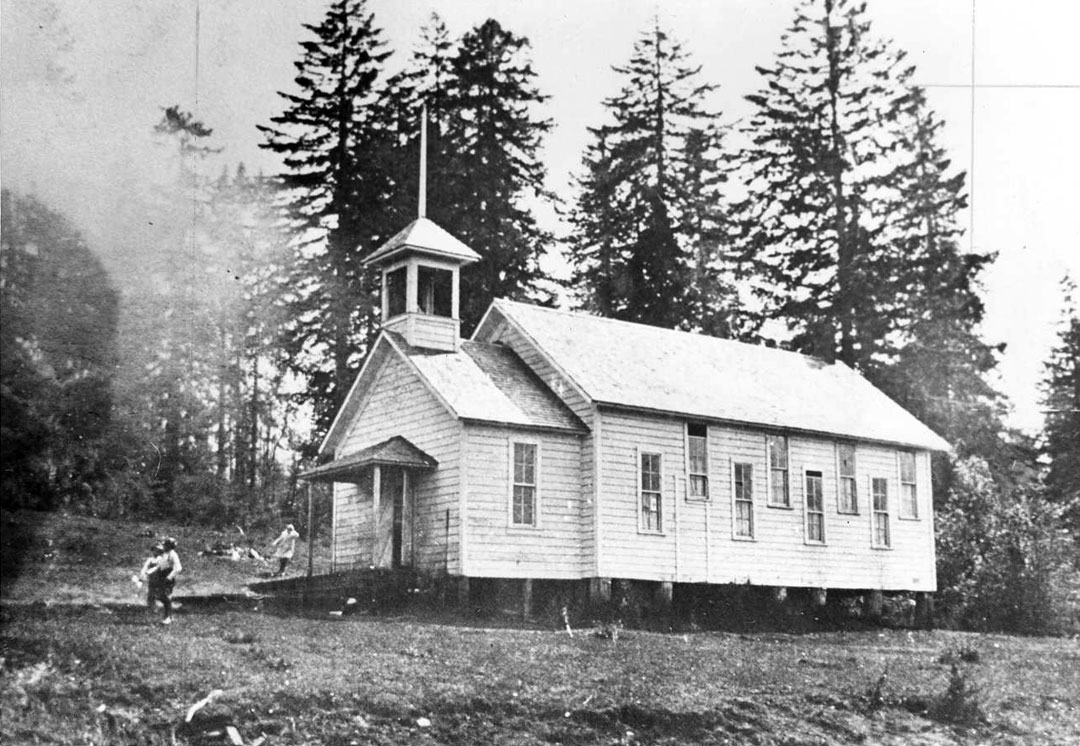
Dixon later remembered that “It was just a little one room wooden floor that had been oiled. Not varnished, oiled. Had black oil on it. And it was heated by a wood circulation heater. All 8 grades was in that one room… there was only 6 of us kids in school. We didn’t even have enough for all 8 grades. One teacher…..If I remember right, there was a couple of kids in the second grade, and stuff was she would hold a talk to them, you know, and have things for them. And then she’d go to the kids that was in whatever grade they were in and have a class, sort of like. And go over your assignments….Individually….the rest of the kids were all interested in their own thing and never paid any attention to that. Once in a while…when I was in the 7th or 8th grade…I’d ride a horse to school. Otherwise I walked. It was a mile and a half to school. We used to get out there and try to play baseball on horses. We’d be in the outfield and chase the baseball on horseback… It was funny how quick those horses would get to what we was doing when we was playing ball. At first, they’d run right on past the ball …but in short order, why, as soon as you got to that ball, they’d stop.”
“The King’s Valley High School was at the corner of Kings Valley Highway and Hoskins road. The last year I went there was in ’44-’45 and when school ended in the spring of ’45, that was the last class that ever went through school. They got rid of it– moved all the kids into Philomath. There wasn’t enough kids. That last year there was only about 15, 16 kids in the whole school….couldn’t afford to keep it open”
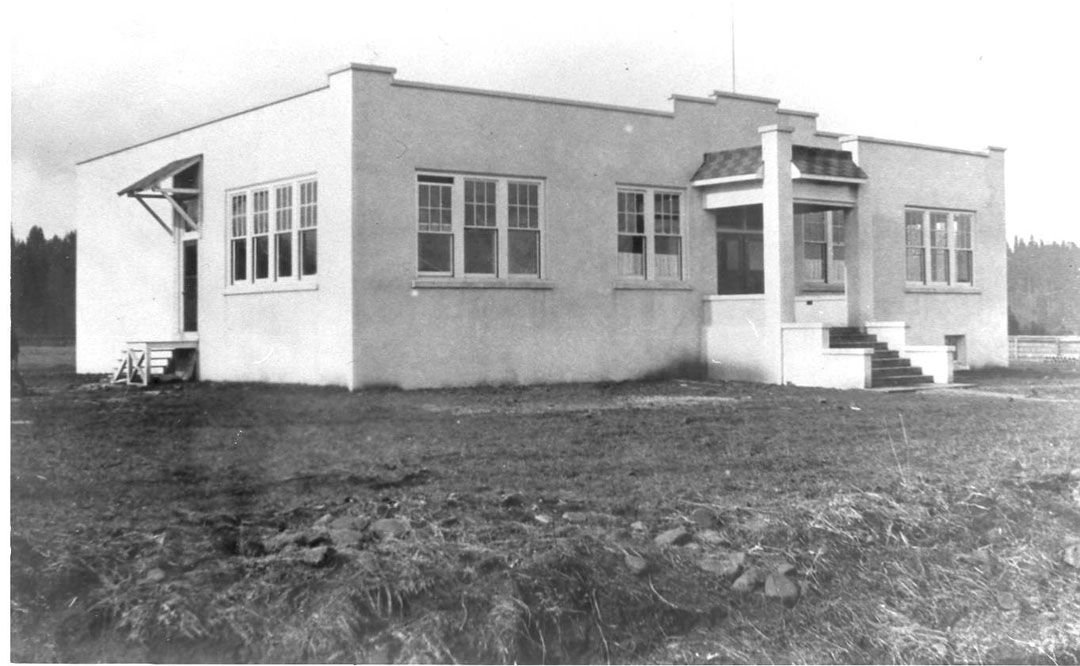
When asked what he did for fun, Dixon replied:
“Lot of times growing up there, I’d go down to the creek and try to catch fish with my hands rather than a fishing pole. Catch crawdads in the little pool. Stuff like that. I spend a lot of time down there in that creek….Oh, when I got old enough–teenager just starting high school…. we’d…mostly come into Corvallis and go to the movies. That’s about all you could do. Once in a while the school would have a skating park party out here at Lakepark, out at Louisburg…Those were fun.”
“Then back off this way, there was a baseball diamond and they had what they call a town team. I used to go to the baseball games when I was just hardly big enough to walk.. I remember going to the baseball games over here ’cause my uncle played on one of them…my mother’s brother.”
The farm did not have electricity until 1945. Before then, “We had kerosene lamps we set around the house. In the evening, before we had electricity and stuff, we used to sit around and play cards. For snacks in the evenings, we ate apples. We had a big fruithouse outside there. The walls were filled with sawdust. We’d go in there in the middle of summer when it was hot outside and the inside of that thing was just as cool as it could be.”
Interviewer Christi Wuertz asked him about chores.
“I helped shock hay….I milked some cows. I helped with the…about a hundred and fifty head of goats and a hundred fifty head of sheep. And several times a year we’d get those in off the mountain cause he [his grandfather] had about 600 acres there of mountains for them to run on. We’d get those in, and especially at lambing time or shearing time, and get that done….Summer time when I wasn’t in school, I was up the canyon cutting firewood for the winter and get it hauled into the woodshed before fall set in too hard.”
He later added, “…Grandma would make root beer. And she’d have it in one of the back rooms of the house there. And we’d come down with a load of wood for the woodshed and Grandad, he’d say, ‘Boy I’m thirsty.’ He says ‘I could sure go for some root beer.’ …So, we’d go to the house, but Grandma would have all the doors locked….we’d keep going from door to door. It was one, two, three, four different doors we could get in that house from. And we kept going from door to door and finally we’d find a door that was open and, man, we’d slip into that room and grab enough rootbeer for the three of us [Bill, his brother, and grandfather]. And about that time she’d figure she’d catch us. And she’d holler at us and chase us clear out the door and we’d start running. Then Grandad would just laugh his head off. We used to think that was so funny, but later on I just figured out that him and her had this all planned ahead of time for us kids’ benefit.”
He also remembered that “We used to hunt and walk all of those hills out there. Above Hoskins. Back behind his place. We used to walk up that canyon and there’s no fences back up in there. We hiked clear through to Wren… Anyway, we’d come out on the top of those mountains up there to where we could look down and see that [the H-H Ranch]. Then we’d turn around and head back towards home We walked miles and miles.”
The next post will continue with Dixon’s observations about the farm.
